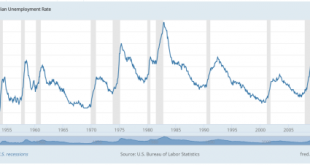from David Ruccio Teaching critical literacy. That’s what professors do in the classroom. We teach students languages in order to make some sense of the world around them. How to view a film or read a novel. How to think about economics, politics, and culture. How to understand cell biology or the evolution of the universe. And, of course, how to think critically about those languages—both their conditions and their consequences. I’ve been thinking about the task of teaching critical...
Read More »Thomas Sargent discovered his inner Marxist. Really. Two graphs.
Graph 1. Unemployment in the USA, % of the labor force, monthly data. One of the central and most pressing questions of macro-economics is how to estimate and explain unemployment. Thomas Sargent, card-carrying member of the neoclassical cabal and winner of the ‘Sveriges Riksbank Prize In Economic Sciences In Memory Of Alfred Nobel’ (SRPIESIMOAN) just made a shot at it. A somewhat Marxist shot, as far as I’m concerned. Which, considering the hard core neoclassical nature of the rest of...
Read More »Hype and facts on free trade
from C. P. Chandrasekhar Voices questioning the claim that nations and the majority of their people stand to gain from global trade are growing louder. The one difference now is that the leading protagonist of protectionism is not a developing country, but global hegemon United States under Donald Trump. Free trade benefits big corporations with production facilities abroad, Trump argues, while harming those looking for a decent livelihood working in America. With time Trump has made...
Read More »Econometrics: The Keynes-Tinbergen controversy
from Lars Syll Mainstream economists often hold the view that Keynes’ criticism of econometrics was the result of a sadly misinformed and misguided person who disliked and did not understand much of it. This is, however, nothing but a gross misapprehension. To be careful and cautious is not the same as to dislike. Keynes did not misunderstand the crucial issues at stake in the development of econometrics. Quite the contrary. He knew them all too well — and was not satisfied with the...
Read More »Demonetisation in India was a great success – for the Better Than Cash Alliance
from Norbert Häring Two years ago, on 8 November 2016 at 8 pm, prime minister Narendra Modi declared most cash in India demonetised, starting a period of several months of severe cash shortage, which imposed a lot of hardship and suffering on the people. The National Herald India invited me to write a guest-comment on the occasion. I have been invited to write a comment on the ‘failure’ of the Demonetisation exercise of Prime Minister Modi. True, it was an obvious failure if you judge it...
Read More »Good news, the stock market is plunging: thoughts on wealth
from Dean Baker Several people on my Twitter feed touted the drop in the stock market last month as evidence of the failure of Donald Trump’s economic policy. I responded by pointing out that he was reducing wealth inequality. I was being only half facetious. I have always been less concerned about wealth than income both because I think wealth is less well-defined and because income is the more important determinant of living standards. In the case of the stock market plunge, the vast...
Read More »Richard Feynman om mathematics
from Lars Syll In a comment on one of yours truly’s posts last week, Jorge Buzaglo wrote this truly interesting comment: Nobel prize winner Richard Feynman on the use of mathematics: “Mathematicians, or people who have very mathematical minds, are often led astray when “studying” economics because they lose sight of the economics. They say: ‘Look, these equations … are all there is to economics; it is admitted by the economists that there is nothing which is not contained in the...
Read More »Calibration — an economics fraud kit
from Lars Syll In his well-written and interesting article The Trouble with Macroeconomics, Paul Romer goes to a frontal attack on the theories that have put macroeconomics on a path of ‘intellectual regress’ for three decades now: Macroeconomists got comfortable with the idea that fluctuations in macroeconomic aggregates are caused by imaginary shocks, instead of actions that people take, after Kydland and Prescott (1982) launched the real business cycle (RBC) model … In response to...
Read More »India’s wealthy barely pay taxes
from C. P. Chandrasekhar and Jayati Ghosh Figure 1: India has very unequal wealth distribution Source: Credit Suisse Global Wealth Report, 2018. India is often mistakenly seen as a country with relatively low economic inequality. In fact, there were always very significant economic inequalities in India, which intersected with social and locational inequalities in complex ways. More significantly, the country’s inequalities widened after the internal and external economic liberalization...
Read More »“Never have corporate profits outgrown employee compensation so clearly and for so long”
from David Ruccio Those aren’t my words. The quotation that forms the title of this post is from a recent Federal Reserve Bank of St. Louisblog post. And they’re important to keep in mind in light of the news coverage (e.g., by the New York Times) of last week’s Labor Department report on hiring and unemployment. Yes, 250 thousand jobs were added in the U.S. economy last month and average earnings did rise by 0.2 percent and are up 3.1 percent over the past year. But. . . The rate of...
Read More » Real-World Economics Review
Real-World Economics Review






